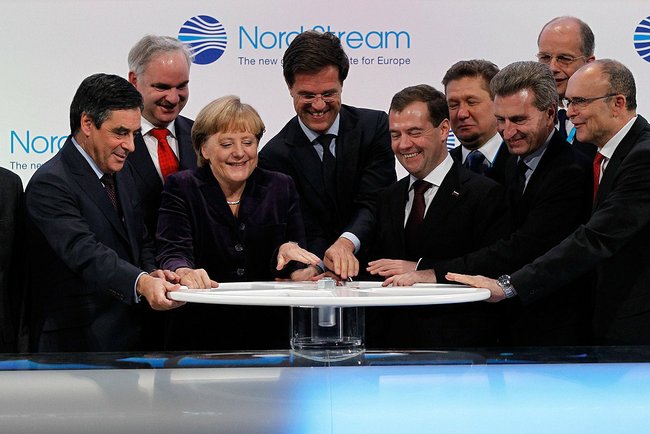By John Collins
Within the context of the deteriorating relationship between Russia and the West, the unceasing debate over the malfeasance of Gazprom business practices rages on. And forgive the author if the tenor of this op-ed is bombastic, vitriolic, and argumentative, but that is exactly the tone taken by European commentators as they ridicule Gazprom every time Russia’s energy giant pursues a self-interested (i.e. smart) economic strategy regarding their gas export to the EU. At the crux of the dispute lies the often misunderstood, and highly politicized, nebulous term of “energy security” and concomitant fears about Russian political machinations seeking to undermine political and economic stability in Ukraine and other Eastern European states. Yet such a didactic approach fails to acknowledge the fact that Gazprom is acting like any other enterprise: seeking to maximize revenue, minimize costs, and hedge against potential risks. Seen in this light, Nord Stream II is not some type of conspiracy trying to place Kiev squarely under Vladimir Putin’s thumb, but rather it is an important component of a broader strategy strengthening Gazprom’s ties with its largest markets and in so doing enhancing Russia’s energy security as a producer state.
Karel Beckerman, in his inflammatory piece entitled ‘Can Nord Stream II be stopped?’, iterates on whether a second pipeline sending Russian gas directly to Germany via the Baltic Sea is compatible with the EU’s “strategy of security of supply.” Immediately this begs the question of how the first Nord Stream project can be compatible with the EU’s energy security strategy while a second is not. From an EU perspective, energy security is equivalent to diversifying where their gas is supplied from. Not only does this hedge against political instability and economic shocks, but increased competition naturally benefits the consumer by allowing for the EU to liberalize its downstream energy markets. However, Nord Stream II does not in any way hinder the proliferation of the LNG trade anymore than it implies a return to long-term contracts and destination clauses. Spot pricing and gas on gas competition, to varying degrees, are going to remain characteristic of a European market subject to the Third Energy Package. Yet the fact remains that Russia is the producer state that actually supplies almost two fifths of the gas consumed by EU citizens and gas exported by Gazprom via the Unified Gas Supply System is cheaper than any alternatives. Should US exports outstrip their Russian counterparts in the price race to the bottom, then their market share will increase, and vice versa. This is simply how the free market operates, rewarding expediency and cost-effectiveness, not political wrangling.
Russia, too, has to look out for its energy security. Gazprom has staked their future on their European clients and the transit states separating them from downstream consumers have been tenuous partners at best since the collapse of the Soviet Union. The relationship between Kiev and Moscow is complicated, to put it mildly, a reality which makes business conditions unstable and unpredictable. Nord Stream II is an attempt to remove variables that are outside the realm of economics from what is essentially an economic transaction.
Of course the magnitude of gas supplied, the absolute necessity of energy resources for the functioning of modern industrial processes, electricity grids, and heating facilities, and the fact that hydro carbon export revenues significantly bolster Russia’s government budget, color this transaction in political overtones. Yet the politics of collective security in Eastern Europe are not axiomatically interlinked with energy trade between Russia and the EU. Indeed, Germany and other West European states such as Holland, welcome another northern pipeline precisely because it removes geo-political concerns from the equation. The fact is that in the medium and longer terms, though hydrocarbon demand is unlikely to grow in Europe, internal production will almost certainly decrease while Norwegian supply plateaus.
So if Europe’s largest economies are actually serious about their energy security, securing unobstructed access to Russian gas delivered via pipeline, minus the risks imposed by transit through foreign countries, seems to be of vital importance. As with most political positions, the lamentations from East European governments are at base driven economic considerations, notably the considerable amount of lost revenue resulting from fewer transit fees.
The relationship between Russia and the EU is a symbiotic one. Gazprom cannot simply squeeze their most significant customer if they want to maintain their privileged market position, and Russia is just as dependant on EU payments as Europe is on Russian resources. The biggest hurdles to Nord Stream II need not be political, but rather legal.
Whether or not an offshore pipeline that nonetheless transgresses over the exclusive economic zone of several EU member states is subject to the third party access rules as stipulated in the third energy package will go a long way in determining if Gazprom (and their partners) will be willing to put up the capital necessary for the project. For at the end of the day investors associated with the Russian energy projects are like investors anywhere in the world; they live off of profit, not the demise of their political adversaries.
If Ukraine is in a protracted conflict, Poland and the Baltic states are forever embittered by their historical experience with their less than pacific gargantuan neighbor, and one can reverse the flow of gas from Germany eastward anyways, then why not streamline the transit route so as to exclude these headaches?
Nord Stream II does nothing to explicitly hinder the diversity of supply and in many respects would augment European security of supply.

